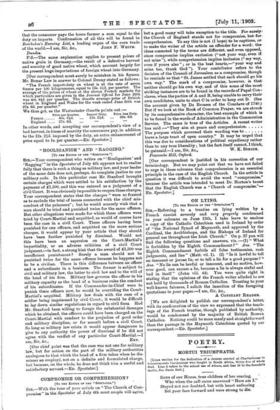" HOOLIGANISM " AND " RAGGING."
[To THE EDITOR OF THE " SPECTATOR."1 SIR,—Your correspondent who writes on "'Hooliganism' and Ragging '" in. the Spectator of July 4th appears not to realise fully that there is such a thing as military law, and your leader
of the same date does not, perhaps, do complete justice to our military code.. In this particular case Mr. Stanford brought certain charges which were settled to his satisfaction by the
payment of B1,500, and this was entered as a judgment of a civil Court. It was obviously impossible to reopen these charges. Your correspondent states that the charges " were so framed as to exclude the trial of issues connected with the chief mis- conduct of the prisoners"; but he would scarcely wish that a man should be tried and punished twice for the same offence. But other allegations were made for which these officers were tried by Court-Martial and acquitted, as would of course have been the case in a civil Court. These officers having been punished for one offence, and acquitted on the more serious charges, it would appear by your article that they should have been further punished by dismissal. Would not this have been an aspersion on the Court-Martial's impartiality, or an adverse criticism of a civil Court judgment,—in fact, a strong hint that the award of 21,500 was insufficient punishment ? Surely a man should not be punished twice for the same offence because he happens not to be a civilian. There is this difference between an officer and a subordinate in a business. The former is subject to civil and military law, the latter to civil law and to the will of the bead of his firm. Military law governs the officer in his military capacity as the head of a business rules the conduct of his subordinates. If the Commander-in-Chief were to punish these officers now, he would be overriding the Court- Martial's acquittal. Military law deals with the case of a soldier being imprisoned by civil Court ; it would be difficult to lay down similar regulations in regard to civil fines. Had Mr. Stanford been willing to forego the substantial damages which he obtained, the officers could have been charged on the Court-Martial with conduct to the prejudice of good order and military discipline, or for assault before a civil Court. So long as military law exists it would appear dangerous to give to any authority the power of dismissal if he did not agree with the verdict of any particular Court-Martial.—I [Our chief point was that the case was not one for military law, but for action on the part of the military authorities analogous to that which the head of a firm takes when he dis- misses an employe, not on a definite and formulated charge, but because, on the whole, he does not think him a useful and satisfactory servant.—En. Spectator.1






































 Previous page
Previous page